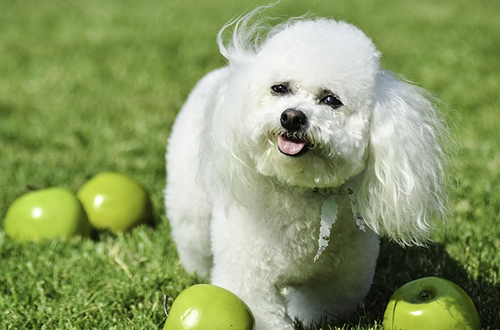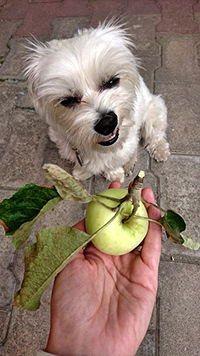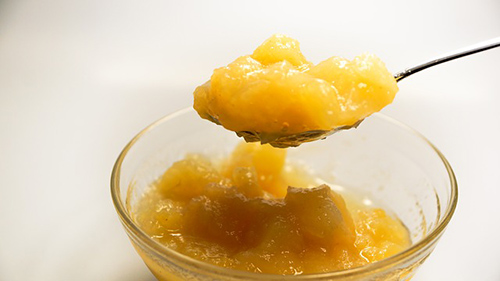
Are apples good for dogs? The answer is absolutely. Your canine friend can enjoy a nutritious, sweet, and juicy apple. However, it must be done in moderation and served the right way.
We all know the incredible health properties of eating an apple daily with all of its delicious goodness. Apples are a delectable treat for your dog with plenty of health benefits according to emergency department head Jerry Klein, DVM at the MedVet in Chicago and American Kennel Club veterinary chief.
Please keep reading to find out how to prepare and serve apples the right way to your canine companion.
Are Apples Good for Dogs?
Most dogs can enjoy apples, barring some allergy or medical condition. But are there any benefits of apples for dogs? Yes, there is. Apples are an excellent low-calorie snack, and they’re a fantastic source of calcium, phosphorous, vitamins A, C, and K.
They’re also high in fiber, giving them prebiotic properties that can help support a healthy gastrointestinal system. Apples are about eighty-six percent water and can aid with hydration on hot summer days.
This excellent fruit can also help your canine companion with that awful doggy breath by keeping their teeth free of the plaque and tartar that contributes to odors. However, this is not a substitute for daily brushing.
The apple’s skin is extremely rich in antioxidants and polyphenols that support the immune system aiding the prevention of many ailments such as joint disease and cancer.
The Right Way to Feed Your Dog Apples
First, contact your veterinarian just as a precaution. Let them know you are planning on adding apples to your dog’s diet. Because of the natural sugars, it wouldn’t be wise to introduce this fruit to fast-growing puppies, obese, and diabetic dogs.

- If you do not have access to organic apples, make sure you wash them thoroughly to avoid your dog ingesting any harsh chemicals or harmful pesticides.
- Cut the apple into small bite-size pieces and discard the seeds, stems, and core. Do not let your dog consume the core. Not only is it a choking hazard, but the seeds also contain small amounts of cyanide, which is a poisonous substance. However, according to Dr. Klein, a single apple would not pose a threat to your canine companion, but it is better to avoid the seeds altogether.
- Apple skin possesses some health benefits; however, it is totally up to you if you peel it or not.
- Once you get the okay from your vet, begin by offering your dog a single slice of the apple to gauge their reaction on whether they like it or not.
- Keep an eye out for any adverse side effects, mainly stress on the digestive system, such as gastrointestinal issues, abdominal pain, upset stomach, vomiting, loose stool, straining to defecate, and bloating. Do not give your dog anymore, and consult your vet immediately if you notice any of these symptoms.
- Hopefully, your dog tolerated the first slice well; therefore, you can go ahead and introduce more pieces. But be careful not to go over the recommended daily servings for dogs.
- The answer to the question of how much apples to serve your dog is simple. A ten-pound dog should receive a quarter of an apple, equivalent to several apples consumed by an adult human. Therefore, please do not allow your puppy to overindulge and limit consumption to a few slices.
The Safest Way to Serve Apples to Your Dog
- Chop up an apple and add it to your dog’s food.
- You can also introduce the fruit one by one as a special treat.
- Apple slices also make excellent training treats for those dogs that love them.
- Another great way to serve apples to your dog is to give them in the form of apple sauce. Add a little water and some peeled and chopped apples into a saucepan and simmer until tender. Give them about one tablespoon daily, and remember to cool before serving.
- Stuff a few apple slices into a dog puzzle toy and have your dog work for treats.

Commonly Asked Questions
- Are apple seeds good for dogs to eat?
Absolutely not! Apple seeds contain small amounts of cyanide, a highly poisonous substance that dogs should not consume. Please remove before serving. - Are dogs safe eating apple pie?
Again, absolutely not! Leave apple pie off of the menu for your dog. The apples are fine, but the other ingredients that make it an all-American favorite, such as nutmeg, cinnamon, sugar, and the buttery crust, can present problems for your dog. - Is apple sauce okay for my dog?
If you are going to serve your dog apple sauce, it is best to make it yourself. Homemade apple sauce is best because of all the added sugars. However, sugar-free is not recommended because it can contain an artificial sweetener called Xylitol that is toxic to your canine companion. - What is a good amount of apples to give to my dog?
A 10-pound dog can consume a quarter of an apple, equivalent to an adult person downing several apples. Therefore, allow your dog only a few slices and do not let them overindulge. - Are green apples okay for dogs?
Absolutely. Green apples are actually healthier for your dog than the red varieties. Green apples possess a lower carbohydrate and sugar content than red apples. And according to Dr. Klein, green apples are richer in vitamin A, which is an essential nutrient for dogs. - Are dried apples healthy for dogs?
This question is an easy no. Dried fruit of all kinds contain excess sugar and are also loaded with preservatives, which is not ideal for your canine companion. Dried apples can also present a choking risk; therefore, it is best to stay with fresh green and organic apples.




